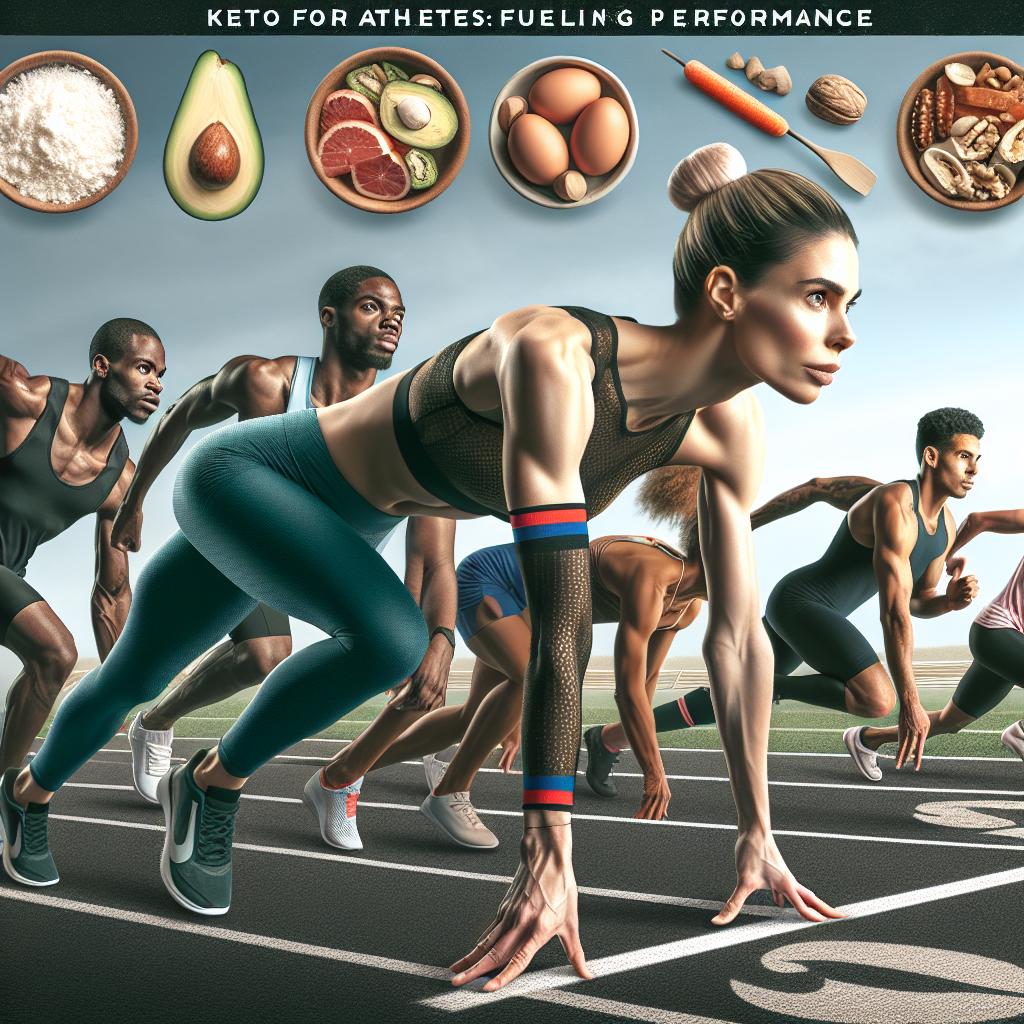This post may contain affiliate links which means I may receive a commission for purchases made through links. Learn more on my Private Policy page.
Keto for Athletes: Fueling Performance
In the ever-evolving world of athletic performance, diets come and go like the seasons, each promising to unlock the secret to peak physical prowess. But among the kaleidoscope of nutritional strategies, one stands out—not just for its distinctive approach but for its potential to transform the way athletes fuel their bodies: the ketogenic diet. As unconventional as it may seem, with its emphasis on fats over carbohydrates, the ketogenic lifestyle is gaining traction among athletes looking to enhance endurance, build strength, and optimize recovery.
But how does this high-fat, low-carb regimen impact those of us who love to sweat it out on the field, court, or gym? Can a slice of avocado toast really take the place of a classic pre-game pasta? Whether you’re a seasoned marathoner, a weekend warrior, or someone simply looking to elevate their fitness game, we’re diving deep into how keto can serve as a powerful ally in your athletic journey. So grab a healthy snack, sit back, and let’s discover how to harness the power of keto to fuel your performance and achieve your goals, one delicious bite at a time!
Understanding the Science Behind Keto and Athletic Performance
The ketogenic diet, primarily characterized by high fat and low carbohydrate intake, shifts the body’s metabolism from relying on glucose to utilizing ketones as a primary energy source. This metabolic adaptation can lead to enhanced fat oxidation during prolonged physical activities. As athletes transition into ketosis, they may experience improved endurance, as ketones provide a more consistent fuel source, reducing the reliance on glycogen stores. This not only equips athletes with a greater reserve during endurance events but may also help mitigate the onset of fatigue, allowing for longer training sessions and enhanced recovery times.
Furthermore, research suggests that a well-formulated keto diet can lead to favorable physiological adaptations, including increased mitochondrial density and improved insulin sensitivity. Athletes may notice several benefits, such as:
- Enhanced Endurance: Shift towards utilizing fat stores, prolonging energy availability.
- Improved Recovery: Reduced inflammation and muscle soreness post-exercise.
- Stable Energy Levels: Reduced fluctuations in energy, allowing for consistent performance.
However, it’s crucial to approach this diet carefully to ensure optimal nutrient intake and to allow the body adequate time to adapt. Tracking macronutrient ratios and overall caloric intake can be key in optimizing performance while following a ketogenic regime.

Choosing the Right Keto Foods for Endurance and Strength
Choosing the right foods on a ketogenic diet is crucial for fueling endurance and strength in athletes. Focus on high-quality, nutrient-dense options that not only support your energy needs but also promote recovery. Include non-starchy vegetables like spinach and kale for vitamins and minerals, while adding healthy fats such as avocados and nuts to sustain energy levels. Incorporating protein sources like grass-fed beef, wild-caught salmon, and free-range eggs provides essential amino acids necessary for muscle repair and growth. When aiming for endurance, consider foods that are easily digestible and can provide quick energy without spiking insulin levels.
To make meal planning easier, you can create a list of keto-friendly foods tailored for your training sessions. Options to consider include:
- Coconut oil or MCT oil for quick energy
- Cauliflower rice for a low-carb grain substitute
- Zucchini noodles for a nutrient-rich pasta alternative
- Nut butters for on-the-go snacking
- Bone broth for hydration and gut health
Utilizing a well-rounded approach will ensure you meet your nutritional goals while supporting your athletic performance. Here’s a quick reference table to visualize the macronutrient breakdown of some great keto foods:
| Food Item | Calories | Fat (g) | Protein (g) | Carbs (g) |
|---|---|---|---|---|
| Avocado (1 medium) | 240 | 22 | 3 | 12 |
| Egg (1 large) | 70 | 5 | 6 | 1 |
| Salmon (100g) | 206 | 13 | 22 | 0 |
| Almonds (28g) | 160 | 14 | 6 | 6 |
| Spinach (1 cup) | 7 | 0.1 | 1 | 1 |

Maximizing Recovery with Ketogenic Nutrition Strategies
Recovering from intense workouts is crucial for athletes seeking to improve their performance, and ketogenic nutrition offers a unique approach to enhance recovery times. By leveraging high-fat, low-carbohydrate meals, athletes can optimize their body’s recovery processes while minimizing inflammation. Emphasizing nutrient-dense foods is key, including:
- Avocados: Rich in healthy fats and potassium, they help reduce muscle soreness.
- Fatty fish: Loaded with omega-3 fatty acids, they combat inflammation post-exercise.
- Nuts and seeds: Excellent sources of magnesium, which plays a role in muscle recovery.
Additionally, timing your meals can significantly affect recovery rates. Consuming a balanced meal shortly after exercise can replenish depleted energy stores and kickstart muscle repair. A simple table illustrates how different post-workout meals can impact recovery:
| Meal | Protein (g) | Fat (g) | Carbohydrates (g) | Recovery Benefit |
|---|---|---|---|---|
| Grilled Salmon with Spinach | 40 | 23 | 0 | Reduces inflammation |
| Chicken Salad with Avocado | 35 | 15 | 5 | Boosts muscle repair |
| Eggs and Olives | 30 | 25 | 1 | Fuels recovery overnight |
Tips for Seamlessly Transitioning to a Keto Lifestyle as an Athlete
Transitioning to a keto lifestyle as an athlete can be both exciting and challenging. To make this shift smoother, start by gradually reducing your carbohydrate intake rather than going cold turkey. This can help mitigate any potential side effects such as the “keto flu” while your body adapts to burning fat for fuel. Focus on incorporating healthy fats and high-quality protein sources into your meals, ensuring you have plenty of energy for workouts. Here are some tips to ease the transition:
- Plan your meals ahead of time to avoid reaching for high-carb options.
- Stay hydrated and consider electrolyte supplementation to combat dehydration.
- Monitor your macros to ensure you’re meeting dietary goals without exceeding carbohydrate limits.
- Incorporate low-carb snacks like nuts, cheese, or avocados to sustain energy levels between meals.
As your body adjusts to ketosis, pay close attention to your performance and energy levels. Track your workouts and how you feel during them. If you’re noticing a drop in performance, you might need to tweak your fat and protein ratios. Opt for nutrient-dense foods to provide adequate fuel while also enhancing recovery. Here’s a simple comparison of macro ratios for optimal performance:
| Macro Category | Traditional Athlete (High-Carb) | Keto Athlete |
|---|---|---|
| Carbohydrates | 55-70% | 5-10% |
| Protein | 15-25% | 20-30% |
| Fats | 15-30% | 70-80% |
Q&A
Q&A: Keto for Athletes: Fueling Performance
Q1: What is the keto diet, and why is it gaining popularity among athletes?
A1: Great question! The ketogenic diet, or keto, is a low-carbohydrate, high-fat eating plan that encourages the body to enter a state of ketosis, where it burns fat for fuel instead of carbs. Athletes are increasingly embracing the keto lifestyle as it can lead to improved endurance, increased fat oxidation, and more stable energy levels during training sessions, which can be a game-changer for performance!
Q2: How does the keto diet affect athletic performance?
A2: When done correctly, the keto diet can enhance endurance by improving your body’s ability to burn fat as a primary energy source. This can be particularly beneficial for athletes engaged in long-duration, low-to-moderate intensity activities. You’ll find that once your body adapts, you have a more consistent energy flow, and you might even find a reduction in pesky energy crashes!
Q3: What types of athletes benefit most from a keto diet?
A3: While the keto diet can be advantageous for many, it’s especially great for endurance athletes like cyclists, runners, and triathletes. These athletes often rely on steady energy over extended periods, making the fat-burning aspect of keto a perfect match. That said, athletes in strength sports can also benefit, but they might require some tweaks to their diet to meet intense training needs.
Q4: What are some common misconceptions about keto for athletes?
A4: Oh, there are quite a few! One common myth is that athletes will lose muscle on keto. In reality, if you’re consuming adequate protein and following a well-planned diet, you can maintain muscle mass while burning fat. Another misconception is that you won’t have enough energy. Once your body adjusts, many athletes report feeling energized and ready to crush their workouts!
Q5: How can athletes get started with keto?
A5: Start with gradual changes! Try lowering your carb intake while increasing healthy fats like avocados, nuts, olive oil, and fatty fish. Don’t forget to include enough protein to support your workouts. Consulting with a sports nutritionist can be incredibly helpful as you transition, ensuring you get the right balance of nutrients to fuel your performance.
Q6: Are there any potential downsides to the keto diet for athletes?
A6: Like any diet, keto isn’t for everyone. Some athletes may experience the “keto flu” during the initial transition, which can include fatigue and headaches. It’s also crucial to monitor your nutrient intake, as cutting carbs can sometimes lead to deficiencies in vitamins, minerals, and fiber. Listening to your body and adjusting your diet as necessary is key!
Q7: Can you share a quick keto-friendly meal idea for athletes?
A7: Absolutely! How about a zesty avocado and egg salad? Simply mash a ripe avocado, mix it with chopped hard-boiled eggs, a squeeze of lemon juice, salt, and pepper. Serve it on a bed of leafy greens, sprinkle some seeds on top, and voilà! A delicious, nutrient-packed meal that’s easy to make and perfect for recovery.
Q8: what’s your top piece of advice for athletes considering keto?
A8: Be patient and give yourself time to adapt! Transitioning to a ketogenic lifestyle doesn’t happen overnight, and everyone’s body reacts differently. Focus on whole, nutrient-dense foods, stay hydrated, and pay attention to how you feel during workouts. It’s all about finding what works best for you while enjoying the process!
And there you have it! With keto as your ally, you’re well-equipped to fuel your athletic journey. Now lace up those sneakers and get ready to perform at your best!
To Wrap It Up
the ketogenic diet offers a unique and exciting approach to fueling athletic performance, allowing athletes to tap into their body’s natural energy reserves. By embracing this low-carb, high-fat lifestyle, you’re not just changing your plate—you’re redefining the way you think about nutrition and energy. Whether you’re powering through a high-intensity workout, going the distance in a marathon, or lifting heavy in the gym, keto can provide the stamina and focus you need to reach new heights.
As you embark on your keto journey, remember that every athlete is unique. Experiment, listen to your body, and find what works best for you. Surround yourself with supportive friends and fellow athletes, and don’t hesitate to share your experiences—after all, the path to peak performance is always better when traveled together.
So lace up those sneakers, grab a handful of nuts, or whip up a delicious avocado smoothie, and get ready to unleash the full potential of your body and mind, fueled by the power of keto. Here’s to your success, one fat-fueled workout at a time!

